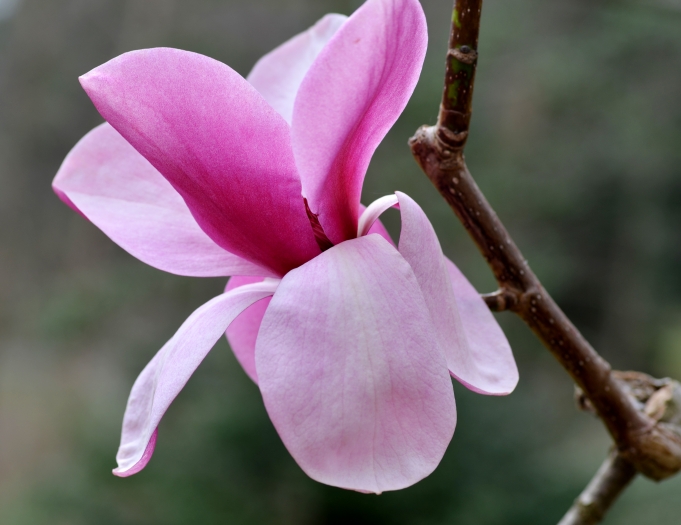Sprenger’s Magnolia
(Magnolia sprengeri)
Sprenger’s Magnolia (Magnolia sprengeri)
/
/

(c)2016 Derek Ramsey (Ram-Man)
CC BY-SA 4.0
Image By:
(c)2016 Derek Ramsey (Ram-Man)
Recorded By:
Copyright:
CC BY-SA 4.0
Copyright Notice:
Photo by: (c)2016 Derek Ramsey (Ram-Man) | License Type: CC BY-SA 4.0 | License URL: https://creativecommons.org/licenses/by-sa/4.0 | Uploader: Ram-Man | Publisher: Wikimedia Commons | Title: Magnolia_sprengeri_'Diva'_Flower.JPG | Notes: ;Name:Mahonia bealei ;Family:Berberidaceae Image no. 1 Permission granted to use under GFDL by Kurt Stueber Source: [http://www.biolib.de www.biolib.de] {{GFDL}} |























Estimated Native Range
Summary
Magnolia sprengeri, commonly known as Sprenger’s Magnolia, is a deciduous tree native to the forested mountain valleys and slopes of Central China. It typically grows to a height of 20 meters with a spreading canopy. The bark is pale grayish brown to blackish brown and exfoliates with age, revealing a textured surface. Young twigs are pale yellowish brown. The tree is celebrated for its large, fragrant flowers that bloom in early spring before the leaves emerge. The flowers are cup-shaped, with petals that range from deep pink to purple, creating a striking display against the bare branches.
Sprenger’s Magnolia is valued for its showy flowers and is often used as a specimen tree in gardens and parks. It prefers full sun to part shade and requires medium to high amounts of water, thriving in soils with medium drainage. The species is adaptable to a variety of soil types, provided they are acidic to neutral. Several cultivars, such as ’Diva’, ’Lanhydrock’, and ’Wakehurst’, have been developed for their exceptional bloom or growth characteristics. Cultivars ’Burncoose’, ’Copeland Court’, and ’Eric Savill’ have received the Royal Horticultural Society’s Award of Garden Merit, indicating their excellence for garden use. Hardy to USDA zone 6, Sprenger’s Magnolia can withstand cold temperatures but may suffer from late spring frosts that can damage the flowers. Pests and diseases are not commonly a significant problem, but it can be susceptible to leaf spot and canker in poor conditions.CC BY-SA 4.0
Sprenger’s Magnolia is valued for its showy flowers and is often used as a specimen tree in gardens and parks. It prefers full sun to part shade and requires medium to high amounts of water, thriving in soils with medium drainage. The species is adaptable to a variety of soil types, provided they are acidic to neutral. Several cultivars, such as ’Diva’, ’Lanhydrock’, and ’Wakehurst’, have been developed for their exceptional bloom or growth characteristics. Cultivars ’Burncoose’, ’Copeland Court’, and ’Eric Savill’ have received the Royal Horticultural Society’s Award of Garden Merit, indicating their excellence for garden use. Hardy to USDA zone 6, Sprenger’s Magnolia can withstand cold temperatures but may suffer from late spring frosts that can damage the flowers. Pests and diseases are not commonly a significant problem, but it can be susceptible to leaf spot and canker in poor conditions.CC BY-SA 4.0
Plant Description
- Plant Type: Tree
- Height: 30-40 feet
- Width: 20-30 feet
- Growth Rate: Moderate
- Flower Color: Pink, Purple
- Flowering Season: Spring
- Leaf Retention: Deciduous
Growth Requirements
- Sun: Full Sun, Part Shade
- Water: Medium, High
- Drainage: Medium
Common Uses
Bee Garden, Bird Garden, Butterfly Garden, Deer Resistant
Natural Habitat
Forested mountain valleys and slopes in Central China
Other Names
Common Names: Wu Dan Yu Lan
Scientific Names: , Magnolia sprengeri, Magnolia sprengeri var. diva, Magnolia denudata var. purpurascens, Magnolia sprengeri var. elongata, Magnolia denudata var. elongata, Magnolia heptapeta f. purpurascens, Magnolia diva, Magnolia purpurascens, Magnolia conspicua var. purpurascens
GBIF Accepted Name: Magnolia sprengeri Pamp.